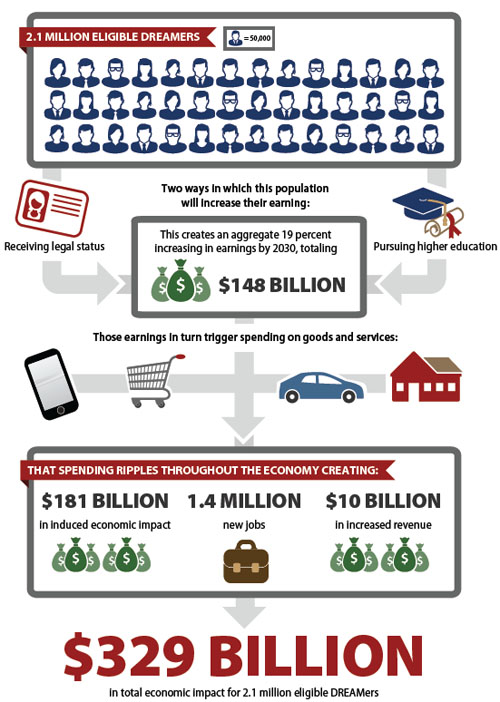Did you know that Truthout is a nonprofit and independently funded by readers like you? If you value what we do, please support our work with a donation.
The DREAM Act was first introduced as a bipartisan measure in 2001, but has languished in Congress ever since. Republicans have blocked the bill, which would help young undocumented immigrants who came to the U.S. as children gain citizenship. President Obama says he supports the policy and issued a directive in June to help protect DREAMers from deportation by giving those who qualify temporary legal status.
But if Congress passed the DREAM Act and granted legal status to eligible undocumented immigrants who came to the U.S. as children, it would add an additional $329 billion to the U.S. economy and 1.4 million more jobs by 2030, according to a new report from the Center for American Progress and the Partnership for a New American Economy. Enacting the DREAM Act would boost the economy first by improving the education and job opportunities for young undocumented immigrants in the U.S. A legal status and education contribute to higher earnings:

“This report proves a fundamental truth about the contributions of immigrants to the American economy: we absolutely need them to continue our economic growth,” said New York City Mayor Michael Bloomberg, Partnership co-chairman. Critics argue that legalizing undocumented immigrants only would create new workers who would take American jobs, but the new report shows that the economic benefits of the DREAM Act would ripple throughout the economy and create new employment.
While the research about the economic benefits of the DREAM Act does not take into account any costs of implementing the law, the report’s authors say the future costs would be minimal. Previously, the Congressional Budget Office estimated that the DREAM Act would increase federal revenues by $1.7 billion over the next 10 years and reduce federal deficits by $2.2 billion over that time. And the DREAM Act could also help fill the 16 million shortfall of college-educated workers that is expected to hit the U.S. by 2025, especially in science and engineering.
A terrifying moment. We appeal for your support.
In the last weeks, we have witnessed an authoritarian assault on communities in Minnesota and across the nation.
The need for truthful, grassroots reporting is urgent at this cataclysmic historical moment. Yet, Trump-aligned billionaires and other allies have taken over many legacy media outlets — the culmination of a decades-long campaign to place control of the narrative into the hands of the political right.
We refuse to let Trump’s blatant propaganda machine go unchecked. Untethered to corporate ownership or advertisers, Truthout remains fearless in our reporting and our determination to use journalism as a tool for justice.
But we need your help just to fund our basic expenses. Over 80 percent of Truthout’s funding comes from small individual donations from our community of readers, and over a third of our total budget is supported by recurring monthly donors.
Truthout has launched a fundraiser to add 340 new monthly donors in the next 5 days. Whether you can make a small monthly donation or a larger one-time gift, Truthout only works with your support.